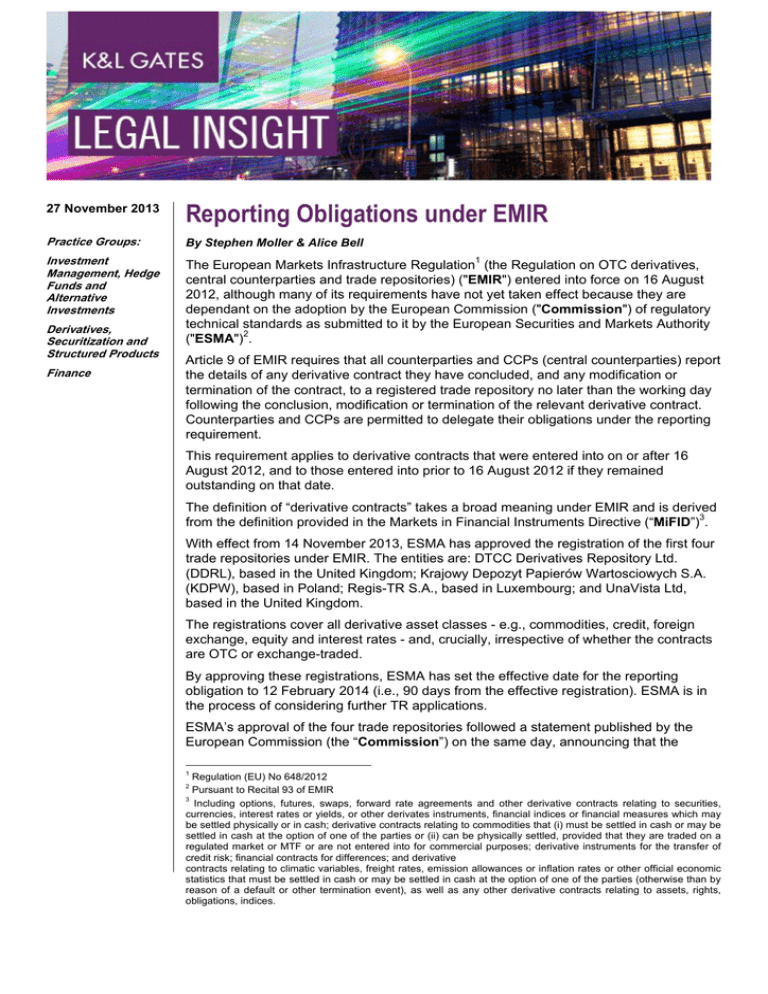
27 November 2013
Reporting Obligations under EMIR
Practice Groups:
By Stephen Moller & Alice Bell
Investment
Management, Hedge
Funds and
Alternative
Investments
The European Markets Infrastructure Regulation1 (the Regulation on OTC derivatives,
central counterparties and trade repositories) ("EMIR") entered into force on 16 August
2012, although many of its requirements have not yet taken effect because they are
dependant on the adoption by the European Commission ("Commission") of regulatory
technical standards as submitted to it by the European Securities and Markets Authority
("ESMA")2.
Derivatives,
Securitization and
Structured Products
Finance
Article 9 of EMIR requires that all counterparties and CCPs (central counterparties) report
the details of any derivative contract they have concluded, and any modification or
termination of the contract, to a registered trade repository no later than the working day
following the conclusion, modification or termination of the relevant derivative contract.
Counterparties and CCPs are permitted to delegate their obligations under the reporting
requirement.
This requirement applies to derivative contracts that were entered into on or after 16
August 2012, and to those entered into prior to 16 August 2012 if they remained
outstanding on that date.
The definition of “derivative contracts” takes a broad meaning under EMIR and is derived
from the definition provided in the Markets in Financial Instruments Directive (“MiFID”)3.
With effect from 14 November 2013, ESMA has approved the registration of the first four
trade repositories under EMIR. The entities are: DTCC Derivatives Repository Ltd.
(DDRL), based in the United Kingdom; Krajowy Depozyt Papierów Wartosciowych S.A.
(KDPW), based in Poland; Regis-TR S.A., based in Luxembourg; and UnaVista Ltd,
based in the United Kingdom.
The registrations cover all derivative asset classes - e.g., commodities, credit, foreign
exchange, equity and interest rates - and, crucially, irrespective of whether the contracts
are OTC or exchange-traded.
By approving these registrations, ESMA has set the effective date for the reporting
obligation to 12 February 2014 (i.e., 90 days from the effective registration). ESMA is in
the process of considering further TR applications.
ESMA’s approval of the four trade repositories followed a statement published by the
European Commission (the “Commission”) on the same day, announcing that the
1
Regulation (EU) No 648/2012
Pursuant to Recital 93 of EMIR
3
Including options, futures, swaps, forward rate agreements and other derivative contracts relating to securities,
currencies, interest rates or yields, or other derivates instruments, financial indices or financial measures which may
be settled physically or in cash; derivative contracts relating to commodities that (i) must be settled in cash or may be
settled in cash at the option of one of the parties or (ii) can be physically settled, provided that they are traded on a
regulated market or MTF or are not entered into for commercial purposes; derivative instruments for the transfer of
credit risk; financial contracts for differences; and derivative
contracts relating to climatic variables, freight rates, emission allowances or inflation rates or other official economic
statistics that must be settled in cash or may be settled in cash at the option of one of the parties (otherwise than by
reason of a default or other termination event), as well as any other derivative contracts relating to assets, rights,
obligations, indices.
2
Reporting Obligations under EMIR
Commission intends not to endorse ESMA’s regulatory technical standards dealing with
the format and frequency of reports to trade repositaries, which it submitted to the
Commission on 7 August 2013 (the “RTS”).
In the RTS, ESMA had recommended postponing the implementation date for exchangetraded derivatives to be reported to trade repositories by a year (i.e., until February
2015), in order to allow ESMA sufficient time to develop associated guidelines. However,
the Commission is of the view that ESMA’s concerns as set out in the RTS do not justify
such a delay.
The reporting requirement will therefore apply to derivative contracts, regardless of
whether they are OTC or exchange-traded, from 12 February 2014.
Authors:
Stephen Moller
stephen.moller@klgates.com
+44.(0)20.7360.8212
Alice Bell
alice.bell@klgates.com
+44.(0)20.7360.8304
Key Contacts:
Stephen Moller
Paul Matthews
Sean Donovan-Smith
Alice Bell
stephen.moller@klgates.com
+44.(0)20.7360.8212
paul.matthews@klgates.com
+44.(0).20.7360.8214
Sean.donovan-smith@klgates.com
+44.(0)20.7360.8202
alice.bell@klgates.com
+44.(0)20.7360.8304
Anchorage Austin Beijing Berlin Boston Brisbane Brussels Charleston Charlotte Chicago Dallas Doha Dubai Fort Worth Frankfurt
Harrisburg Hong Kong Houston London Los Angeles Melbourne Miami Milan Moscow Newark New York Orange County Palo Alto
Paris Perth Pittsburgh Portland Raleigh Research Triangle Park San Diego San Francisco São Paulo Seattle Seoul Shanghai
Singapore Spokane Sydney Taipei Tokyo Warsaw Washington, D.C. Wilmington
K&L Gates practices out of 48 fully integrated offices located in the United States, Asia, Australia, Europe, the
Middle East and South America and represents leading global corporations, growth and middle-market
companies, capital markets participants and entrepreneurs in every major industry group as well as public
sector entities, educational institutions, philanthropic organizations and individuals. For more information
about K&L Gates or its locations, practices and registrations, visit www.klgates.com.
This publication is for informational purposes and does not contain or convey legal advice. The information herein should not be used or relied upon
in regard to any particular facts or circumstances without first consulting a lawyer.
©2013 K&L Gates LLP. All Rights Reserved.
2
